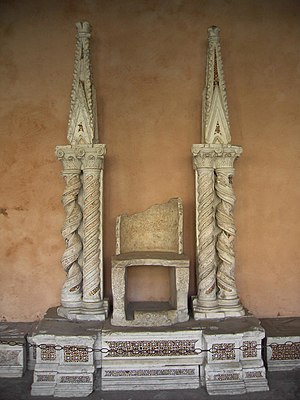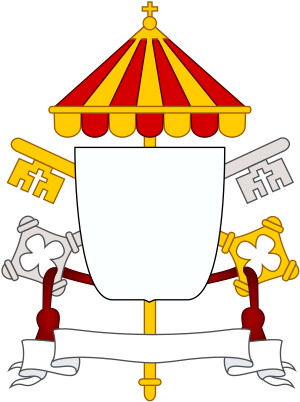Major basilica


A major basilica (Latin: Basilica maior; plural: Basilicae maiores) is one of the four highest-ranking Roman Catholic church buildings, all of which are also papal basilicas:[1] the Archbasilica of Saint John Lateran, St. Peter's Basilica, the Basilica of Saint Paul Outside the Walls, and the Basilica di Santa Maria Maggiore. All of them are located within the diocese of Rome: St. Peter's Basilica is located in Vatican City and thus within the territory and sovereign jurisdiction of the Holy See. The other three are geographically located in Italian territory, but enjoy extraterritorial status under the Lateran Treaty. The Archbasilica of Saint John in the Lateran is the seat of the Pope and the site of the Papal Cathedra, and is the oldest and first in rank of the major basilicas.
All other churches that have the title of basilica are minor basilicas (Latin: basilica minor).[2]
History[edit]
The title of "major basilica" was introduced in 1300 by Pope Boniface VIII. With the promulgation of the bull Antiquorum fida relatio, he instituted the Holy Year and set the conditions for its indulgences. Boniface VIII renewed certain "great remissions and indulgences for sins" which were to be obtained "by visiting the city of Rome and the venerable basilica of the Prince of the Apostles". He offered "not only full and copious, but the most full, pardon of all their sins" to those who fulfilled certain conditions: First, as truly penitent, they had to confess their sins, and, second, they had to visit on pilgrimage the basilicas of St. Peter and Saint Paul, the respective burial sites of the apostles Pope Saint Peter and Saint Paul.
In the second jubilee year in 1350, Pope Clement VI designated as a third major basilica Saint John in the Lateran, the Cathedral of Rome. He encouraged the faithful to make daily visits to Saint John in the Lateran, besides those to the basilicas of St. Peter and Saint Paul. Finally, for the next jubilee year in 1390, the Basilica of Saint Mary Major, the oldest church in Rome dedicated to the Blessed Virgin, was added to the list. Visiting these four churches has remained one of the conditions for gaining the Roman Jubilee indulgence.
Jurisdiction thereof pursuant to the Lateran Treaty[edit]
Pursuant to the Lateran Treaty of 1929 between the Vatican City State and Italy, the three major basilicas located in Rome, but not within the territory of the Vatican City itself (as is the Major Basilica of St. Peter's), are within Italian territory and not the territory of the Vatican City State.[3] However, the Holy See fully owns these three Major Basilicas not within the territory of the Vatican City, and Italy is legally obligated to recognize its full ownership thereof[4] and to concede to these three properties "the immunity granted by International Law to the headquarters of the diplomatic agents of foreign States".[5] Thus, while of the major basilicas, the Basilica of St. Peter's alone is within the territory and sovereign jurisdiction of the Vatican City, the other three major basilicas enjoy extraterritorial status similar to that of foreign embassies while being within Italian territory. Consequently, all four of the major basilicas are patrolled internally by police agents of Vatican City State. These properties, located across Rome, are legally deemed to be essential institutions necessary to the character and mission of the Holy See for which extraterritoriality is justified.
Papal basilicas[edit]
The four major basilicas, together with the Minor Basilica of Saint Lawrence outside the Walls, all of which are in Rome, were formerly known as "patriarchal basilicas", along with a few other churches outside of Rome. Upon relinquishing the title of "Patriarch of the West" in 2006, Pope Benedict XVI officially renamed the "patriarchal basilicas" as "Papal basilicas".[6] The five, formerly styled "patriarchal basilicas" of Rome, were previously assigned to and associated with the five ancient patriarchates of the Latin Church, or the Pentarchy:[7]
- Saint John Lateran was associated with Rome (Patriarch of the West),
- Saint Peter's with Constantinople (Latin Patriarch of Constantinople),
- Saint Paul's with Alexandria (Latin Patriarch of Alexandria),
- Saint Mary Major with Antioch (Latin Patriarch of Antioch), and
- Saint Lawrence with Jerusalem (Latin Patriarch of Jerusalem).
As indicated, the title of "patriarchal basilica", now replaced with "Papal basilica", was also officially given to two churches associated with St. Francis of Assisi and situated in or near his home town of Assisi, Italy:
Thus there are four papal major basilicas and three papal minor basilicas. In addition, there is a multitude of minor basilicas throughout the world which have not been granted the official appellation "Papal" as the aforementioned three have.
List of major basilicas[edit]
To this class belong the four great ancient churches of Rome:
- Archbasilica of Saint John Lateran, also called the Lateran Archbasilica, is the cathedral of the Bishop of Rome, the Pope. It is the only one called an "archbasilica". Its full official name is "Papal Archbasilica of the Most Holy Saviour and of Saints John the Baptist and the Evangelist at the Lateran, Cathedral of Rome".[8]
- St. Peter's Basilica, also called the Vatican Basilica, is a major pilgrimage site, traditionally said to be built over the burial place of Saint Peter. The largest church in the world by some measures, it is used for most of the chief religious ceremonies in which the Pope participates. Its official name is the "Papal Basilica of Saint Peter in the Vatican".[9]
- Basilica of Saint Paul Outside the Walls, also known as the Ostian Basilica because it is situated on the road that led to Ostia, is built over the burial place of Paul the Apostle. Its official name is the "Papal Basilica of Saint Paul Outside the Walls".[10]
- Basilica di Santa Maria Maggiore, also called the Liberian Basilica because the original building (not the present one) was attributed to Pope Liberius, is the largest church in Rome dedicated to the Blessed Virgin Mary, hence its name of Saint Mary Major, i.e. the Greater. Its official name is the "Papal Basilica of Saint Mary Major".[11]
Privileges and attributes[edit]
These four major basilicas are distinguished by their having a holy door and for being prescribed destinations for visits as one of the conditions for gaining the Roman Jubilee. Only the Pope and his delegates may celebrate Mass at the high altar. Until recently, the four churches were open 24 hours a day; their staff included a college of priests to be continually available to hear confessions.
See also[edit]
Other articles of the topics Christianity AND Catholicism : First Council of Constantinople
Other articles of the topic Christianity : Full communion, Orthodox-Catholic Church of America, Think Big Ministries, First Council of Constantinople
Other articles of the topic Catholicism : Latin, First Council of Constantinople
Some use of "" in your query was not closed by a matching "".
References[edit]
- ↑
 Gietmann, G. and Thurston, Herbert (1913). . In Herbermann, Charles. Catholic Encyclopedia. New York: Robert Appleton Company.CS1 maint: Multiple names: authors list (link)
Gietmann, G. and Thurston, Herbert (1913). . In Herbermann, Charles. Catholic Encyclopedia. New York: Robert Appleton Company.CS1 maint: Multiple names: authors list (link)
- ↑ For ancient basilicas, it is common to refer to them as immemorial basilicas.
- ↑ Lateran Treaty of 1929, Article 15 (The Treaty of the Lateran by Benedict Williamson (London: Burns, Oates, and Washbourne Limited, 1929), pages 42-66)
- ↑ Lateran Treaty of 1929, Article 13 (Ibidem)
- ↑ Lateran Treaty of 1929, Article 15 (Ibidem)
- ↑ "Basilicas in Italy, Vatican City State, San Marino". www.gcatholic.org. Retrieved 2017-07-15.
- ↑
 Adrian Fortescue (1913). . In Herbermann, Charles. Catholic Encyclopedia. New York: Robert Appleton Company.
Adrian Fortescue (1913). . In Herbermann, Charles. Catholic Encyclopedia. New York: Robert Appleton Company.
- ↑ Archbasilica Papale di San Giovanni in Laterano – Arcibasilica del SS.mo Salvatore e dei Santi Giovanni Battista ed Evangelista al Laterano - Cattedrale di Roma (Annuario Pontificio 2012, ISBN 978-88-209-8722-0 Search this book on
 ., p. 1293).
., p. 1293).
- ↑ Basilica Papale di San Pietro in Vaticano (Annuario Pontificio 2012, ISBN 978-88-209-8722-0 Search this book on
 ., p. 1291).
., p. 1291).
- ↑ Basilica Papale di San Paolo fuori le mura (Annuario Pontificio 2012, ISBN 978-88-209-8722-0 Search this book on
 ., p. 1294).
., p. 1294).
- ↑ Basilica Papale di Santa Maria Maggiore (Annuario Pontificio 2012, ISBN 978-88-209-8722-0 Search this book on
 ., p. 1295).
., p. 1295).
External links[edit]
| Wikimedia Commons has media related to Major basilicas. |
| Look up basilica in Wiktionary, the free dictionary. |
- List of All Major, Patriarchal and Minor Basilicas and statistics by GCatholic.
This article "Major basilica" is from Wikipedia. The list of its authors can be seen in its historical and/or the page Edithistory:Major basilica. Articles copied from Draft Namespace on Wikipedia could be seen on the Draft Namespace of Wikipedia and not main one.







